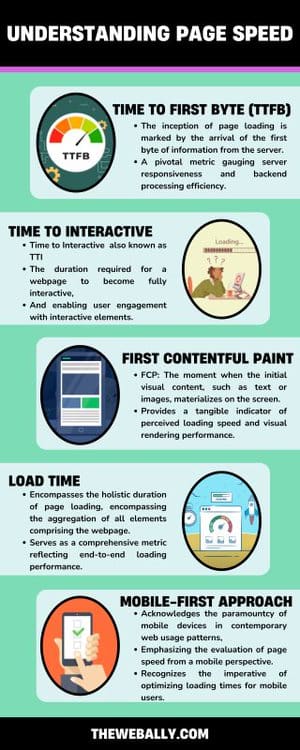In the ever-evolving landscape of digital presence, the significance of website page speed has surged to unprecedented heights as we venture into 2024. This seemingly minute factor exerts a profound influence on various facets of online performance, extending its reach from search engine rankings to user engagement metrics and conversion rates.
In this comprehensive guide, we embark on a journey to unravel the intricate nuances surrounding page speed, delving deep into its essence, importance, optimal benchmarks, troubleshooting methods, and optimization strategies.

At its core, page speed encapsulates the temporal dimension of user experience, delineating the time taken for a webpage to fully load.
However, this seemingly straightforward metric embodies a multifaceted realm, encompassing diverse elements that collectively define the user’s interaction with the website. To elucidate the intricate tapestry of page speed, let us dissect its various constituents:
The inception of page loading, marked by the arrival of the first byte of information from the server.
A pivotal metric gauging server responsiveness and backend processing efficiency.
The duration required for a webpage to become fully interactive, enabling user engagement with interactive elements.
Offers insights into potential bottlenecks arising from JavaScript execution and client-side rendering.
The moment when the initial visual content, such as text or images, materializes on the screen.
Provides a tangible indicator of perceived loading speed and visual rendering performance.
Encompasses the holistic duration of page loading, encompassing the aggregation of all elements comprising the webpage.
Serves as a comprehensive metric reflecting end-to-end loading performance.
Page speed emerges as a linchpin in the intricate machinery of Search Engine Optimization (SEO), wielding a pervasive impact on search engine rankings, user experience, and conversion rates alike. Here’s a succinct elucidation of the symbiotic relationship between page speed and SEO:
Page loading velocity assumes pivotal significance in search engine algorithms, underscoring Google’s aversion towards sluggish websites that impede user satisfaction.
Accelerating page speed augments crawlability, indexing efficiency, and overall search engine visibility, thereby enhancing organic search performance.
The linchpin of user-centric design, page speed exerts a profound influence on user experience, with prolonged loading times engendering user frustration and abandonment.
Swift-loading websites foster a seamless browsing experience, curbing bounce rates and augmenting engagement metrics, which in turn, catalyze SEO performance.
Page speed stands as a cornerstone of Conversion Rate Optimization (CRO), wielding a palpable influence on user retention, conversion funnel progression, and transactional outcomes.
Streamlining page loading facilitates frictionless user journeys, mitigating user attrition and amplifying conversion rates, thereby fortifying the website’s revenue-generating potential.
The pursuit of an optimal page speed threshold remains a perennial quest, with benchmarks contingent on diverse variables such as page type, user expectations, and industry norms.
While conventional wisdom extols the virtues of a sub-2 second loading time, pragmatic considerations necessitate a nuanced evaluation of page speed metrics tailored to specific contexts.
Embark on a journey towards page speed optimization, embracing an arsenal of best practices and strategic interventions to bolster loading efficiency.
Emphasize the deployment of a robust hosting infrastructure, leverage caching mechanisms, streamline codebase through minification, and optimize asset delivery via Content Delivery Networks (CDNs).
In 2023, the digital world changed a lot. Now, how fast your website loads is super important for success online.
As businesses try to keep up with all these changes, making sure your website loads quickly is like having a secret weapon for being better than your competition and getting more people to visit your site through search engines.
To do this, companies need to focus on making their websites easy to use and super fast. This means using smart designs and new technology to make sure people can get around your website quickly, without having to wait too long for pages to load.
This helps protect your website from being slow or outdated in the fast-moving world of the internet. If you want a website for your business that is optimally maintained in terms of page speed and SEO, contact The Web Ally today!
Self-service covers every aspect of life these days, but we still believe in the power of having someone to talk to. Maybe it's to bounce off ideas and explore new opportunities. Maybe it's just to say hello.
In any case, we will only use your contact details to get in touch with you regarding your enquiry - and nothing else!